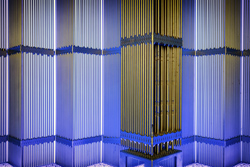Supporting nuclear waste management
Generation IV reactors slated for deployment between 2020 and 2030 consist of six advanced design concepts. They embody technology for sustainability, economics, safety, reliability and proliferation resistance. An important pillar of all these is dealing effectively with radioactive waste. Transmutation or transformation of sources of long-lived radioactivity into stable or short-lived materials will be a significant aspect. It will not only improve the sustainability of future nuclear reactors but reduce the radiotoxicity of current waste inventories. Accurate assessment and development of appropriate technologies can only occur with a reliable nuclear database. The EU-funded project 'European research infrastructures for nuclear data applications' (ERINDA)(opens in new window) created a network of facilities and experts to deliver the needed information. Neutron beam technology is at the centre of novel research into transmutation of radioactive waste. The ERINDA consortium pooled outstanding neutron data facilities in Europe that generously shared their valuable beam time. The goal was to create the necessary data set to develop realistic simulations predicting the operating conditions of the innovative reactor systems. Transnational access made possible with funding provided to the ERINDA consortium enabled over 3 000 hours of beam time in 26 experiments. Participation of PhD students and postdoctoral students was strongly encouraged. An additional 16 short-term visits totalling 106 weeks in duration provided scientists with the opportunity to exchange ideas and resources at consortium institutes. Coordination of research on nuclear data measurements is speeding the development of databases required for more precise models of proposed nuclear reactor concepts. ERINDA outcomes have already improved the simulation of the nuclear fission process for a comprehensive range of target nuclides and energies. That in turn will lead to faster development of technologies to improve nuclear waste management and nuclear reactor safety with benefits for all.







